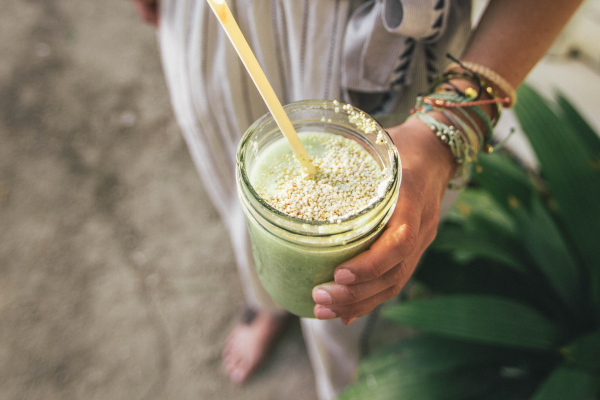Last updated May 21, 2024
It seems everyone and their mother these days are taking to rivers, lakes and the sea for an outdoor dip. And for good reason. Wild swimming is linked to many benefits—both mental and physical.
A growing body of research reveals that nature heals and that being in an outdoor environment actually reduces stress. In turn, nature positively contributes to physical and mental well-being. The Japanese practice of Shinrin-yoku (forest bathing) has become increasingly popular as a way to improve feelings of happiness, lower blood pressure, boost the immune system and accelerate recovery from illness.
This new kid in town is named wild swimming. So get ready because open-water enthusiasts from all over the world are taking the plunge. Calling all swimmers—come rain, shine and even snow!
Whether it’s a quick dip in a lake, venturing into a river or braving the cold of an ocean, immersing yourself in a natural body of water surrounded by nature is a truly uplifting experience.
Benefits of Water
Marine biologist-turned-author Wallace J. Nichols wrote a bestselling book on the benefits of water. Titled Blue Mind: The Surprising Science That Shows How Being Near, In, On, Or Under Water Can Make You Happier, Healthier, More Connected, and Better At What You Do, this novel is full of scientific facts about water. Specifically, how natural bodies of water aid the average person.
Don’t judge the book by its cover! If you aren’t a fan of hard facts, statistics and abstracts, this book is still for you. Nichols shares personal experiences to back up his evidence. He also shares stories from a variety of people. All of whom experience the powerful healing that can only be in pools of blue.

What Is Wild Swimming?
When someone mentions wild swimming, you probably envision dozens of swimmers entering some icy lake in the midst of winter. Or perhaps you think of Karen Gaffney swimming 21 miles across the English Channel. Your immediate thoughts are spot-on. This is how it became so popular in recent years.
In actuality, the term “wild swimming” refers to any opportunity to swim in more obscure, outdoor, natural settings. An underwater cave in Mexico or the IRONMAN triathlon. Wherever and whatever you deem as an opportunity to swim in obscure, outdoor, natural settings qualifies as wild swimming. After all, the “wild” aspect is what is believed to be so invigorating. Extreme temperatures and distances aside, of course.
Don’t forget that it is also the component that is believed to offer the most health benefits. This element of nature has the power to heal, revive and rejuvenate.

What Are the Health Benefits?
Several health benefits have been documented when it comes to wild swimming. There are benefits for physical health, emotional health, spiritual health, social health and intellectual health. Whatever category you find that your health is declining, water and wild swimming can help.
There are numerous ways to conduct wild swimming. It can be done in an outdoor pool, lake, river, ocean, hot spring, or quarry. Notwithstanding, many of these health benefits relate to submersion in extremely cold waters.
Remember the ALS Ice Bucket Challenge in 2014? It was designed to represent the difficulty of living with ALS. The frozen sensation gave a quick shock to the body. It puts your circulatory system into overdrive. The quickened blood flow warms your core so that it can protect vital organs.
Specific advantages in cold-water settings include an enhanced mood, reduced stress and improved vascular circulation (which we just mentioned). At the same time, this type of swimming also is known to reduce muscle and joint pains for extended periods of time. If you are feeling achy, perhaps today is the day to go for a wild cold water swim!
Some people even claim that it helps their migraines, boosts their immune system and improves their self-confidence.
Wild Swimming in Warm Water vs. Cold Water
While these health benefits are mostly noted with swimming in colder waters, wild swimming in warmer waters also offers advantages. Besides the comfort of maintaining a warm body temperature, swimming in warm waters can help you to slow down and enjoy nature. For some people, it is hard to focus on anything when they are experiencing chills and tingling all over their skin. That’s where the benefit of warm water comes into play. Warm water eliminates the distraction of the sensual cold, allowing you to be fully present.
For one, the natural beauty where one swims facilitates a reconnection to nature.
This reconnection is known to enhance spiritual and mental wellness while also encouraging physical exercise. Likewise, wild swimming is best enjoyed when shared with a group.
Benefits of Being Near Water
Whether the water is cold or warm, wild swimming can have amazing impacts on your mental and spiritual health. Just being near water can drastically improve your overall well-being. American novelist Shauna Niequist wrote her self-help book Present Over Perfect: Leaving Behind Frantic for a Simpler, More Soulful Way of Living on the shores of Lake Michigan. Her muse for self-help that would help others was the water’s edge. Coincidence? Highly unlikely!

The Smart Approach to Wild Swimming
If you are thinking about trying wild swimming, there are some precautions you might want to consider. This is especially true for wild swimming in cold waters. The risk of hypothermia is all too real.
Experts indeed support swimming in these instances due to their health benefits. It’s also true that they encourage sticking to some basic rules.
First, allow your body to acclimate to the temperature change. You can do this by slowly submerging yourself in the water. And secondly, do not stay submerged for more than 20 minutes. Too cold and too long typically do not bode well for a person.
By following these recommendations, and by swimming with a group, you can best realize all the health benefits wild swimming has to offer.

Wild Swimming—from Domestic to Exotic
For many wellness seekers, swimming is an activity they perform all the time. More often than not, they can swim right in their own backyard. In-ground or above-ground pools, local lakes, ponds, rivers and waterfronts can serve as excellent resources for a wild swim surrounded by nature.
However, there are others who prefer to enjoy wild swimming on a wellness retreat or travel escape. Numerous open water options exist in the United States. These open water options include, but are not limited to, the Crystal River in Florida, Havasupai Falls in Arizona, Ka’anapali Beach in Hawaii and Lake Dunmore in Vermont.
More exotic locales for wild swimming include Mexico’s natural swimming holes (cenotes) and caves. Many of these things can be done at family-friendly aquatic theme parks such as the Xel-Ha Theme Park or the XCaret. Or take it to the other side of the world and swim in the coves along Ireland’s Wild Atlantic Way. Another great option is swimming in the Baltic Sea, located just off the coast of Finland.
No matter what your preference, wild swimming is an excellent wellness activity with notable health benefits. Not only notable but scientifically proven! Wild swimming is something you certainly should consider if you’re looking for a wellness adventure.
About Vacayou
At Vacayou [pronounced VACAY – YOU], we believe that travel has the power to change lives. The power to revive, rejuvenate and redirect your inner wellness warrior. And that’s why we’re here. Vacayou brings the world of wellness travel to you!
No matter how far or how adventurous, our team scours the globe to curate the best in wellness travel. However, the booking process can often be time-consuming and complicated. We’ve made it much easier to search, discover, and book wellness and active vacations. With Vacayou’s Instant Book, your dream wellness getaway is now just one click away.
Start the trip of your lifetime today, with Vacayou. We are here to help create a healthier global community through wellness and active travel.
To keep up with the latest wellness trends and experiences, be sure to subscribe to our newsletter.


